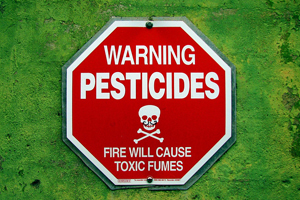The article from the Washington Post, below, highlights how much sway the pesticide industry has in the U.S. government, regardless of the administration in power. Not only do chemical companies hold lobbying power, they also have had a role in drafting the laws that are supposed to regulate their actions and protect consumers. This is a dangerous conflict of interest that has proved, time and again, to lead to public safety concerns. For example, glyphosate (which is one of the most widely used pesticides) was deemed safe by regulatory agencies but has been linked to cancer in ongoing lawsuits against its manufacturer.
 |
The USDA is in charge of pesticide oversight in the agricultural sector. As in other areas, the USDA tends to be lax in its analysis of all relevant data. Often chemical manufacturers produce their own safety data and studies, which are then taken as fact by regulators. Other federal agencies including the Public Health Service and Food and Drug Administration have taken different approaches to evaluating “poisons” for public use. Some only consider negative effects if they are immediate. The health and environmental effects of long-term exposure are rarely studied.
Whenever pesticides or other chemicals are being introduced to the changing market, regulators should use the precautionary principle: accepting new products or processes whose ultimate effects are disputed or unknown should be resisted. As the Washington Post article elucidates, the fact that policymakers and regulators do not take a hard line toward pesticides is not a Republican or Democrat problem. It is everyone’s problem—although some individuals are put at higher risk than others.
In better news, some states are taking action against specific pesticides. Vermont is banning consumer use of neonicotinoid pesticides by July 2019, and California is in the process of banning chlorpyrifos.
Organic food is produced without these pesticides. Cornucopia and its allies will continue to work to keep it that way, using precautionary principles that take into account all science—not just those studies funded by chemical companies.
Why both major political parties have failed to curb dangerous pesticides
The Washington Post
by Elena Conis
The news that David Bernhardt, President Trump’s Interior Secretary nominee, blocked a federal report on the risks certain pesticides pose to hundreds of endangered species has enraged scientists and environmental groups.
“It is clear Mr. Bernhardt will always put the profits of his special-interest allies above the well-being of this nation’s most imperiled animals and plants,” said a coalition of 31 environmental and health-advocacy groups in a statement opposing Bernhardt’s nomination.
But as infuriating as the Trump administration’s favoritism toward the pesticide industry may be, it’s actually nothing new. Since the dawn of the modern pesticide era during World War II, federal regulators in administrations from both major parties have adopted lax, pro-industry standards that have allowed potentially dangerous pesticides to remain legal.

